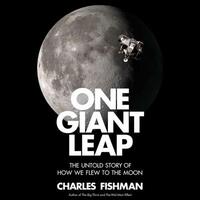You need to sign in or sign up before continuing.
Take a photo of a barcode or cover
My buddy and I read this for our bimonthly book club and both ranked it about a 4.25/5. In One Giant Leap, Fishman gives a detailed account of the decade leading up to the first moon landing and how that shaped both the country and the world, notably by jumpstarting the digital age, an achievement so great that it rivals its failure: that NASA failed to figure out what to do next.
Though the book did tend to lean a bit heavily on patriotism (“[landing on the Moon] was a new version of Manifest Destiny. Going to the Moon was a test and a demonstration of America’s resolve, its ability, its strength, its brilliance”), it offers a fascinating insight to the politics at the time, especially the ins and outs of Kennedy’s approach to the Space Race amid the context of our relationship with the Russians' success in space — “it was Kennedy’s genius and boldness that created the race to the Moon… Kennedy wanted a single leap that was distinctly American in ambition” — while giving a behind-the-scenes look at Kennedy’s motivations and just as important his hesitations, so many that Fishman concluded had Kennedy not been assassinated, the country wouldn’t have followed through with the Apollo missions.
He also situated the Space Race within the at-times chaotic decade that was the ‘60s, isolating it from that cultural swing as its own endeavor and perhaps what made it so successful. The strength of this book is clearly Fishman’s ability to navigate the terminology and rocket science of the ten-year mission and come out with a narrative that’s easy to follow, while still giving enough details on the science and math that it doesn’t seem slimmed down (it is a pretty dense 335 pages, after all) and weaving in some pretty entertaining story (like how NASA approached bringing a flag to the Moon).
And though Kennedy may have been the central character of the book, the biggest weakness of this book is probably the challenges that Fishman doesn’t quite overcome when piecing together narratives of tens of thousands of people. Fishman does follow some people, but the sheer number of experts and politicians involved in the race makes the book somewhat unwieldy at times.
Still, this book presents a single-volume history of one of the most fascinating science endeavors of the country, while contextualizing it within the era and outlining the legacy that such an endeavor left behind: “That is the spirit of America and it is the essence of the American dream: to imagine something that is out of reach, and then do what’s necessary to make it happen, to prove that it wasn’t out of reach after all.”
Though the book did tend to lean a bit heavily on patriotism (“[landing on the Moon] was a new version of Manifest Destiny. Going to the Moon was a test and a demonstration of America’s resolve, its ability, its strength, its brilliance”), it offers a fascinating insight to the politics at the time, especially the ins and outs of Kennedy’s approach to the Space Race amid the context of our relationship with the Russians' success in space — “it was Kennedy’s genius and boldness that created the race to the Moon… Kennedy wanted a single leap that was distinctly American in ambition” — while giving a behind-the-scenes look at Kennedy’s motivations and just as important his hesitations, so many that Fishman concluded had Kennedy not been assassinated, the country wouldn’t have followed through with the Apollo missions.
He also situated the Space Race within the at-times chaotic decade that was the ‘60s, isolating it from that cultural swing as its own endeavor and perhaps what made it so successful. The strength of this book is clearly Fishman’s ability to navigate the terminology and rocket science of the ten-year mission and come out with a narrative that’s easy to follow, while still giving enough details on the science and math that it doesn’t seem slimmed down (it is a pretty dense 335 pages, after all) and weaving in some pretty entertaining story (like how NASA approached bringing a flag to the Moon).
And though Kennedy may have been the central character of the book, the biggest weakness of this book is probably the challenges that Fishman doesn’t quite overcome when piecing together narratives of tens of thousands of people. Fishman does follow some people, but the sheer number of experts and politicians involved in the race makes the book somewhat unwieldy at times.
Still, this book presents a single-volume history of one of the most fascinating science endeavors of the country, while contextualizing it within the era and outlining the legacy that such an endeavor left behind: “That is the spirit of America and it is the essence of the American dream: to imagine something that is out of reach, and then do what’s necessary to make it happen, to prove that it wasn’t out of reach after all.”
slow-paced
Interesting history with a particular emphasis on the political beginnings of Apollo in the Kennedy administration, and the development of the computer technology essential to the moonshot’s success.
adventurous
challenging
hopeful
informative
inspiring
reflective
slow-paced
I was looking forward to reading this book but found it very difficult to get through. Chronologically the book skips around constantly making it hard to follow. The writing style is all about facts and figures and barely any human interest. For such a huge moment in history this story needed telling so much better than this book managed to do.
This could have been three times as long and I would have been happy. I love space.
adventurous
challenging
hopeful
informative
inspiring
medium-paced
Out of all of the space race books I’ve read, this one has been the most unique. It offers a look beyond the general facts that have become prevalent in the media/the typical narrative of the story.
One Giant Leap is a play-by-play look at the Apollo program politically, logistically, and scientifically. It’s less focused on the science that propelled the rocket to the moon, rather the human side. What was the driving force behind President Kennedy’s ‘We choose to go to the moon’ speech?
I almost wish I’d taken notes or purchased a physical copy of the book to tab along the way. I found it thought-provoking and it makes me want to research some of the topics further.
Moderate: Death, Fire/Fire injury
Minor: War
informative
reflective
medium-paced
I didn’t do this on purpose, but this year I read three books on the early space program (Beyond by Stephen Walker, Rocket Boys by Homer Hickam Jr., and this one). Across all three, I learned a lot of interesting details from very different perspectives. With this book in particular, I really enjoyed the plain language explanations of complex concepts. There were a lot of interesting behind the scenes factoids. I also appreciated how much credit was given to all the “back end” work and workers who made these milestones possible.
Fascinating; A great mix of technology, politics, history. A wonderful story of the people, famous and unknown, who were the pioneers of Apollo and so many things that came afterwards in space and on earth.
informative
slow-paced
informative
slow-paced
Really fascinating, in-depth look at the circumstances leading up the moon landing and just how much science and engineering had to be leveraged to get there.
Fishman did a good job rounding out the hypotheticals (like, would we have still gone to the moon if JFK hadn't been shot?) as well as explaining why understanding the reality of the moon landing, not just the mythos, is still important today.
I liked that there was a balance of science, politics and a human element to show the "real truth" behind the momentous event.
Fishman did a good job rounding out the hypotheticals (like, would we have still gone to the moon if JFK hadn't been shot?) as well as explaining why understanding the reality of the moon landing, not just the mythos, is still important today.
I liked that there was a balance of science, politics and a human element to show the "real truth" behind the momentous event.





